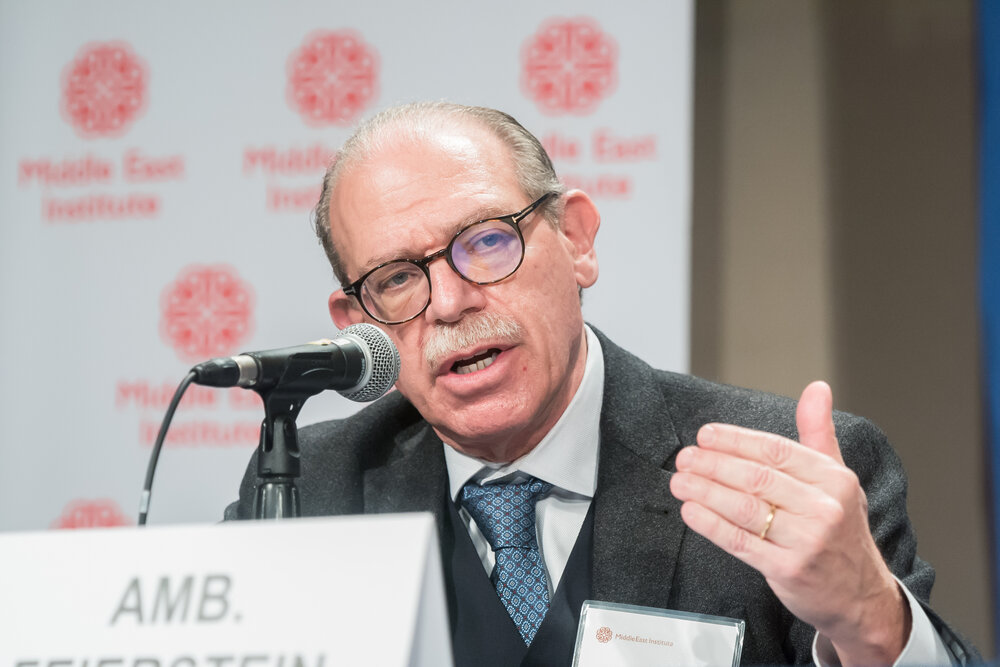

TEHRAN – Noting that the U.S. has its critical interests in West Asia, the former U.S. ambassador to Sanaa says that Beijing is the “most urgent national security issue” to Washington.
“The U.S. clearly considers great power competition, especially with China, as its most urgent national security issue,” Gerald Michael Feierstein tells the Tehran%20Times.
For decades, the United States has been engaged in West Asia. Regional powers, including Iran, Russia, Saudi Arabia, and Turkey, have tried to change the balance, seeking new allies and competing more fiercely with one another. But beyond the headlines, China has been the biggest rival to the U.S in West Asian policies. In fact, Beijing is the largest buyer of the region’s oil.
“I think there are a number of factors that are influencing a desire in Riyadh to reduce regional tensions. These include a need to focus on domestic challenges, a recognition that an outbreak of open conflict in the region would be damaging to Saudi Arabia, and an interest in coordinating more closely with what the Saudi leadership recognized as changing U.S. positions.”For Washington, this means West Asia is reemerging as a scene of great power competition.
China’s deepening alignment with Iran and friendly links to anti-American groups pose long-term risks to the U.S. The Biden administration has no way but to impose costs on China and Iran to keep their budding strategic partnership. It should also be recognized that most of Washington’s West Asian allies and partners—including Israel and the Persian Gulf states—are reluctant to take sides in a U.S.-Chinese geopolitical rivalry.
“Nevertheless, as we see right now in the outbreak of Israeli-Palestinian violence, the U.S. has critical interests in the Middle East (West Asia) that will always require its engagement,” Feierstein remarks.
Following is the text of the interview:
Q: It seems Saudi Arabia is changing its foreign policy when it comes to Qatar, Iran, and Yemen? What is the main cause of this policy shift?
A: I think there are a number of factors that are influencing a desire in Riyadh to reduce regional tensions. These include a need to focus on domestic challenges, a recognition that an outbreak of open conflict in the region would be damaging to Saudi Arabia, and an interest in coordinating more closely with what the Saudi leadership recognized as changing U.S. positions.
Q: Is America going to get rid of West Asia and focus on other areas in Asia to confront China? Is West Asia important yet for policy-makers in the U.S.?
A: The U.S. clearly considers great power competition, especially with China, as its most urgent national security issue. Nevertheless, as we’re seeing right now in the outbreak of Israeli-Palestinian violence, the U.S. has critical interests in the Middle East (West Asia) that will always require its engagement.
Q: In Trump’s presidency, Persian Gulf Arab countries witnessed sharp disagreements. Do you expect a kind of harmony between these countries during Biden’s term?
A: The issues that are challenging the region today, for example, the social and economic challenges from the Covid-19 pandemic and the rising climate change and environmental challenges, favor regional cooperation and coordination. This recognition may be driving what we are seeing at the moment in reduced tensions among the regional states. The Biden administration will support steps to reduce regional tensions, including between Saudi Arabia and its neighbors.
Q: Given your experience in West Asia, what is the logic of states and regimes’ behaviors in the region? How could a Western observer understand West Asia?
A: I think it’s important to recognize that each state in the region is unique in its history, culture, and traditions and that we shouldn’t make broad general statements about the drivers of decisions in individual countries. A Western observer should keep that in mind when trying to understand the dynamics at play in the countries in the region, or more broadly in the world. To understand a country, one needs to study that country, its history, and its people.
Q: Given U.S. experience in Iraq and Afghanistan, do you think America will continue its so-called the democratization move in the region, especially when we talk of Washington’s Arab allies like Saudi Arabia, Egypt, and the UAE?
A: As an American, I believe that democratic systems of governance offer the greatest stability and opportunity for citizens and that, therefore, the U.S. should promote democratic reforms when raising governance issues. The U.S. should be seen globally as an advocate for human rights and civil liberties. But it’s also true that each country needs to make its own decisions about the best way to manage its affairs and what the best approach to governance might be.
Related posts:
Views: 0
 RSS Feed
RSS Feed
















 May 18th, 2021
May 18th, 2021  Awake Goy
Awake Goy  Posted in
Posted in  Tags:
Tags: 
















